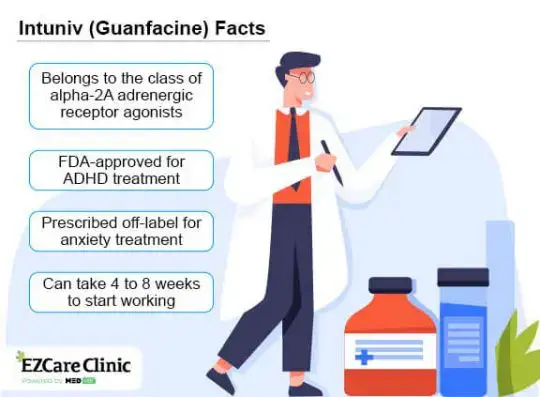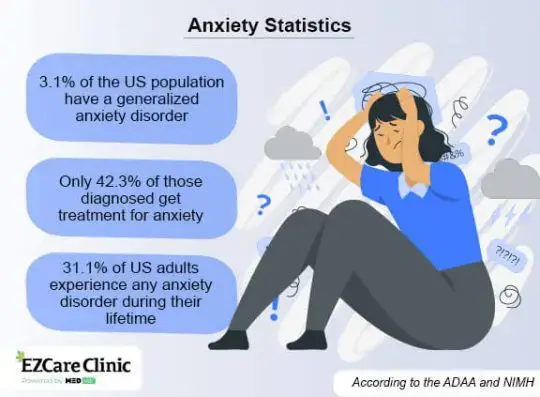Anxiety is a common mental health issue among adults of all ages in the United States. Anxiety disorders can have a significant impact on someone’s quality of life, including their physical health, relationships, and ability to function in everyday life. According to
To treat anxiety, mental health professionals recommend attending therapy or taking medicines. In this article, we will discuss how Intuniv medication works, how it can help those suffering from anxiety, and its potential side effects. We will also look at the research that has been done on the effectiveness of Intuniv in treating anxiety.
A General Review of Intuniv
Intuniv is a brand name for the generic drug guanfacine, which belongs to an alpha-2A adrenergic receptor agonist class. It works by stimulating certain receptors in the brain to decrease the release of noradrenaline. This helps to reduce the symptoms of anxiety, such as feeling overwhelmed or worried.
Intuniv is a non-stimulant medication approved by the U.S. Food and Drug Administration (FDA) to treat attention-deficit/hyperactivity disorder (ADHD). It is usually prescribed to children and adolescents aged 6 to 17 years old. There have not been any studies regarding the effect of prescribing Intuniv for anxiety in adults. Nonetheless, there are effective FDA-approved medications that can be prescribed for anxiety in adults, such as SSRIs (selective serotonin reuptake inhibitors) like Zoloft (sertraline), Prozac (fluoxetine), Lexapro (escitalopram), and benzodiazepines like Xanax (alprazolam), etc.

Intuniv Dosage
The recommended starting dose of Intuniv for patients with anxiety is 1 mg taken once daily (in the morning or evening). This dose may be increased up to 7 mg if necessary, and it is the maximum recommended daily dose. Also, patients should not crush the tablets.
Since Intuniv is not a stimulant, it can have a slower onset of action and may take up to 4-8 weeks to reach its full effect. It should be taken as prescribed by your doctor, and if you decide to stop taking Intuniv, consult with your doctor first to know how to do it right and get another medication prescribed if needed.
Intuniv Side Effects
Intuniv is generally considered to be very safe, with few side effects.
Common side effects include:
- Fatigue
- Tiredness
- Sleepiness
- Dizziness
- Low blood pressure
- Nausea
- Increase in appetite
- Headache
- Dry mouth
- Irritability
- Constipation
- Stomach pain
In most cases, these side effects may resolve on their own over time.
Additionally, Intuniv can also cause more serious side effects. Your doctor needs to know immediately if you get any of these:
- Hypotension
- Fainting
- Unusually slow heartbeat
- Chest pains
- Skin rash or face swelling
Recommendations and Warnings
If you use Intuniv, your healthcare provider should monitor your heart rate and make sure your blood pressure is not too low. Intuniv can also interact with other medications, so let your doctor know about any other meds or supplements that are being taken. Intuniv should also not be taken with alcohol, as it can increase the risk of side effects.
Guanfacine for anxiety may cause a decrease in concentration, mental clarity, and reaction time. Abstain from dangerous activities like driving or using machinery until the body gets used to the medication. If these symptoms persist after a few days, it is best to contact your doctor.
If you’ve been taking Intuniv for some time, abruptly ceasing its use may result in a “rebound” effect, leading to high blood pressure. Other withdrawal symptoms may include headaches, accelerated heart rate, nausea, chest tightness, or feelings of nervousness or unease. To avoid such issues, try to never miss a dose and do not stop taking Intuniv without first consulting with your MD. They can assist you in safely and gradually discontinuing the medication.
Finally, guanfacine may elevate the risk of abnormal heart rate. If you’re using drugs to manage your heartbeat, discuss it with your doctor since they may have to alter the dosage of your meds or give you an alternate drug.
Intuniv is not a cure for anxiety, but it can help to reduce symptoms and improve overall functioning. Note that Intuniv is not intended to replace therapy or other treatments for anxiety.

Bottom Line: How to Treat Anxiety?
Overall, it is recommended to use Intuniv for ADHD treatment. However, it is also a safe and effective medication for
If you want to get hold of your anxiety symptoms, consult a certified medical healthcare specialist at MEDvidi. During an online visit, they will screen your condition and assess your symptoms. Your doctor will develop a personalized treatment plan and prescribe the best drugs right for you.













